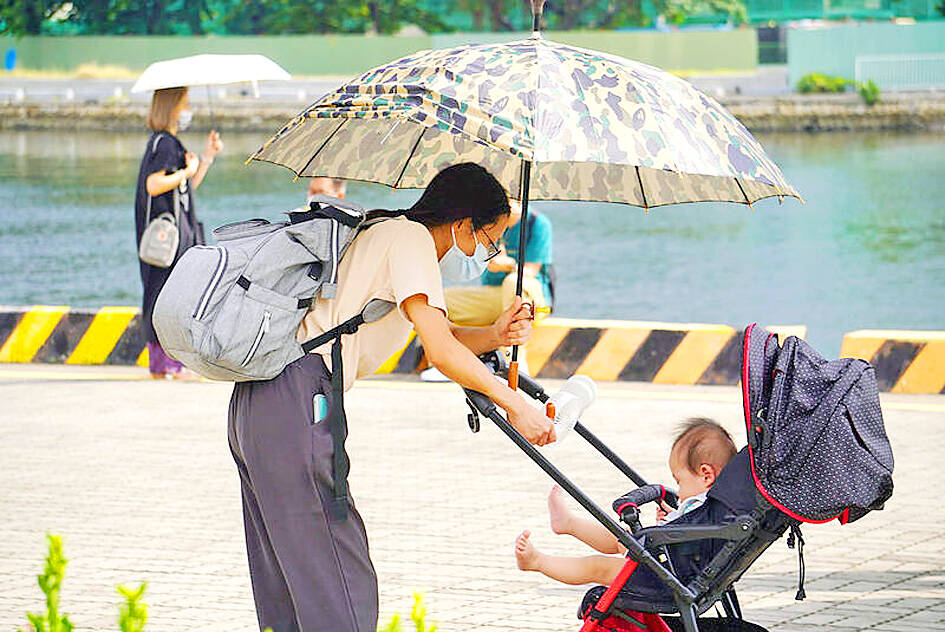The number of women in Taiwan living near or below the poverty line has increased by 20,000 over the past 10 years, with about one-third of those being single mothers, a Ministry of Health and Welfare report showed.
Ten years ago, the primary earners of two-thirds of low and lower-middle-income households in Taiwan were men, but the trend over the past decade has shown a growing percentage of households where women were the primary earners, the report showed.
There were 91,000 female-headed households living near or below the poverty line in 2013, accounting for 37.6 percent of all households in that income bracket. By 2023, that number had risen to 110,000, or 43.98 percent.

Photo: CNA
Many impoverished women in Taiwan are in their 40s or 50s, who often care for elderly parents or children in the evenings after working full-time during the day, the ministry said.
Among female-headed households in this category, 27.8 percent are single-parent families with children younger than 18, it added.
The “feminization of poverty” first gained academic attention in the US during the 1980s amid rising divorce rates and births outside of marriage — factors which place single mothers at greater risk of falling into a cycle of poverty, Soochow University Department of Social Work professor Hung Hui-fen (洪惠芬) said yesterday.
The core issue behind single mothers’ poverty is the high cost of raising children, she said.
“I once interviewed a single mother working as a legal adviser at a major financial holding company — someone whose income was in the top 20 percent in Taiwan at the time,” she said.
“However, despite her income, following her divorce, she had to take on additional work to maintain the equivalent of a dual-income lifestyle for her child, as the child’s father did not provide stable financial support,” she added.
Moreover, many women choose to leave the workforce during pregnancy or after childbirth, which disrupts their employment during marriage and worsens their financial situation after divorce, leading to a domino effect, she said.
The gender wage gap and traditional patriarchal beliefs in Taiwan also often result in divorced women receiving less support from their families, making their situations even more difficult, she added.
“However, Taiwan’s wave of growing female poverty is not solely due to changes in family structure. For example, the weakness of the pension system means many elderly women are not adequately protected,” she said.
Social and Family Affairs acting director Chou Tao-chun (周道君) echoed Hung’s statements, saying that persisting social values and gender stereotypes cause women to shoulder most childcare and household responsibilities, leading to career disruptions and other difficulties.
To alleviate family burdens, the government is promoting new childcare policies for children up to the age of six, he said, adding that the policies would increase childcare subsidies and provide more affordable childcare options to help families.
Currently, only about 2 percent of the population qualifies as “poor,” but a more realistic threshold would be 6 percent, a member of an advocacy group said on condition of anonymity.
“We urge legal amendments to broaden protections for the truly economically disadvantaged, improve translation services and other mechanisms for minority groups to ensure unimpeded access to welfare, and bolster childcare support systems,” they said.
Additional reporting by Rachel Lin

A strong continental cold air mass is to bring pollutants to Taiwan from tomorrow, the Ministry of Environment said today, as it issued an “orange” air quality alert for most of the country. All of Taiwan except for Hualien and Taitung counties is to be under an “orange” air quality alert tomorrow, indicating air quality that is unhealthy for sensitive groups. In China, areas from Shandong to Shanghai have been enveloped in haze since Saturday, the ministry said in a news release. Yesterday, hourly concentrations of PM2.5 in these areas ranged from 65 to 160 micrograms per cubic meter (mg/m³), and pollutants were

Taiwan’s armed forces have established response protocols for a wide range of sudden contingencies, including the “Wan Chun Plan” to protect the head of state, the Ministry of Defense (MND) said today. After US President Donald Trump on Saturday launched a series of airstrikes in Venezuela and kidnapped Venezuelan President Nicolas Maduro, concerns have been raised as to whether China would launch a similar “decapitation strike” on Taiwan. The armed forces regularly coordinate with relevant agencies and practice drills to ensure preparedness for a wide range of scenarios, Vice Minister of National Defense Hsu Szu-chien (徐斯儉) told reporters before a

EVA Airways on Saturday said that it had suspended a pilot and opened an investigation after he allegedly lost his temper and punched the first officer several times as their plane was taxiing before takeoff at Los Angeles International Airport. According to a report published on Thursday by The Reporter, the incident occurred after the flight’s Malaysian first officer tried to warn the Taiwanese pilot, surnamed Wen (文), that he was taxiing faster than the speed limit of 30 knots (55.6kph). After alerting the pilot several times without response, the first officer manually applied the brakes in accordance with standard operating

NOT AN OPENING: Trump’s violation of international law does not affect China’s consideration in attacking Taiwan; Beijing lacks capability, not precedent, an official said Taiwanese officials see the US’ capture of the president of Venezuela as a powerful deterrent to Beijing’s aggression and a timely reminder of the US’ ability to defeat militaries equipped with Chinese-made weapons. The strikes that toppled Venezuelan President Nicolas Maduro signaled to authoritarian leaders, including Chinese President Xi Jinping (習近平), US President Donald Trump’s willingness to use military might for international affairs core to US interests, one senior official in Taipei’s security circle said. That reassured Taiwan, the person said. Taipei has also dismissed the idea that Trump’s apparent violation of international law could embolden Beijing, said the official, who was not